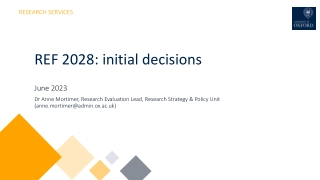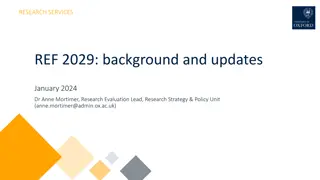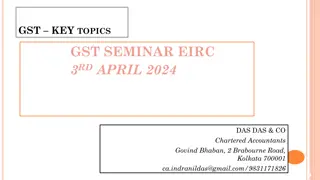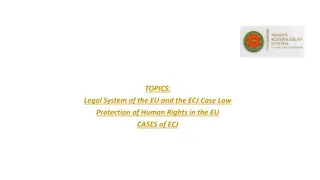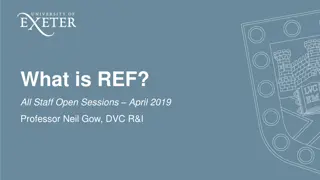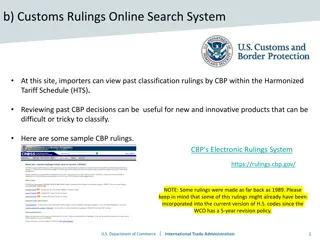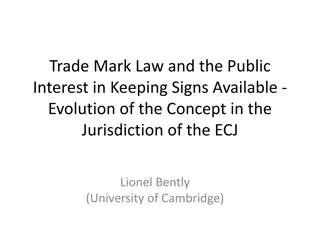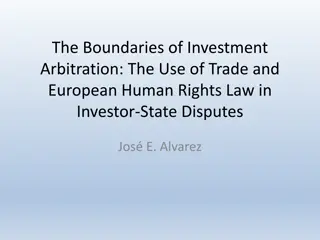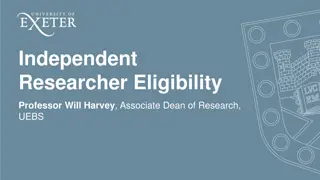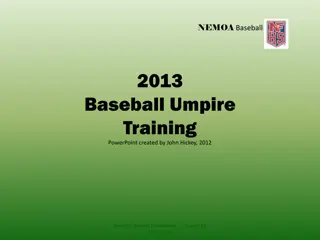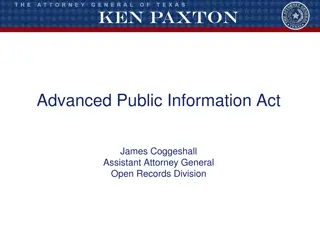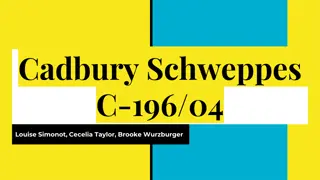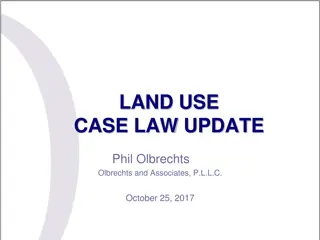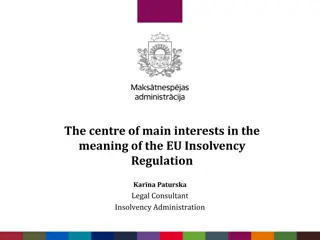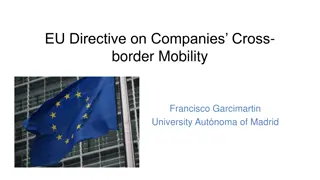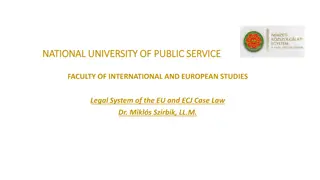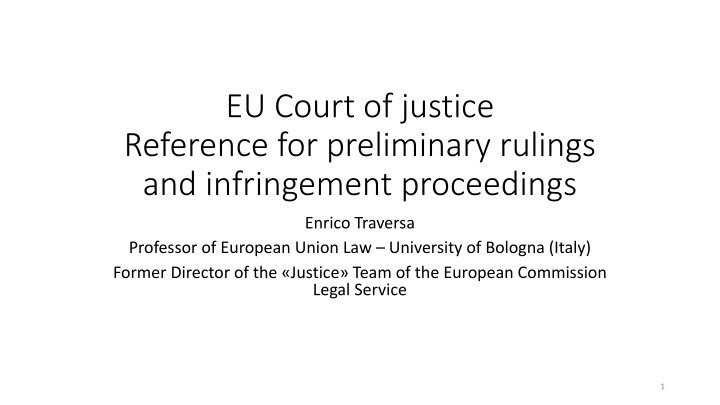
EU Court of Justice - Article 267 TFEU Overview
Explore the structure, content, and procedural aspects of Article 267 TFEU which governs the reference for preliminary rulings to the EU Court of Justice. Learn about the roles of Member State judges, conditions for references, types of EU law acts interpretable by the ECJ, and more.
Download Presentation

Please find below an Image/Link to download the presentation.
The content on the website is provided AS IS for your information and personal use only. It may not be sold, licensed, or shared on other websites without obtaining consent from the author. If you encounter any issues during the download, it is possible that the publisher has removed the file from their server.
You are allowed to download the files provided on this website for personal or commercial use, subject to the condition that they are used lawfully. All files are the property of their respective owners.
The content on the website is provided AS IS for your information and personal use only. It may not be sold, licensed, or shared on other websites without obtaining consent from the author.
E N D
Presentation Transcript
EU Court of justice Reference for preliminary rulings and infringement proceedings Enrico Traversa Professor of European Union Law University of Bologna (Italy) Former Director of the Justice Team of the European Commission Legal Service 1
Structure of Article 267 TFEU a) MS judges are also competent for applying EU law b) Court of justice is the specialised judge for interpreting EU law c) A request for a preliminary ruling is a procedural issue in the framework of a case pending before a MS court d) A reference to ECJ for a preliminary ruling starts non-contentiuos preceedings before ECJ (it s not a litigation) e) Technical cooperation relationship and therefore no hierarchical link between ECJ and MSs judges 2
Content of Art. 267 TFEU: only MSs courts are entitled or required to raise questions before ECJ. a) Court is a notion of EU law alone not depending on MSs law b) Courts are mainly MSs ordinary judges (public prosec. are not courts) c) If in doubt, ECJ applies to a MS body the six following criteria: 1)independence; 2) established by law; 3) permanent nature; 4)compulsory jurisdiction; 5) it applies rules of law; 6) inter partes procedure d) Reference to ECJ is admitted in any kind and stage of legal proceedings A) MSs courts of first instance and appeals courts: option to refer B) MSs courts of last instance: obligation to refer a question to ECJ B.1) exception: settled case-law or acte clair 3
Content of Article 267 TFEU: EU law acts whose interpretation may be requested to ECJ a) Provisions of EU Treaties (incl.CFR) and general principles of EU law b) Provisions of all binding acts of EU Institutions: legislative acts (art. 289, such as regulations and directives), delegated acts (art. 290), implementing acts (art. 291), individual decisions. c) Non binding EU acts (e.g. recommendations) d) ECJ judgements and other acts e) Interpretation of EU law on the basis of a reference from MS law f) Not admitted: interpretation of rules of national law and/or declaration of their incompatibility with EU law 4
Conditions and procedural aspects of references to ECJ a) The order for reference falls within the exclusive competence of the MS judge. Exception: proceedings before the referring c. are closed/dismissed b) Conditions for reference to ECJ: b.1) provisions of EU law are applicable in the main proceedings b.2) such provisions give rise to doubts of interpretation c) Mandatory minimum content of the order for reference: c.1) description of facts of the main proceedings c.2) description of applicable national law and case-law c.3) explanation as to the applicability of EU law c.4) formulation of the questions (ECJ may rephrase such questions) d) Language of proceedings: the language of the referring judge 5
The procedure before the European Court of Justice a) The order for reference is notified to the parties in the main proceedings, to EU Institutions and to all Member States. b) Written pleadings may be lodged within a two months deadline c) ECJ may put written questions to the parties to the proceedings d) Hearing before an ECJ Chamber or before the Grand Chamber e) Opinion of the Advocate general f) ECJ judgment/order decided by majority vote g) ECJ may issue orders in case of inadmissibility or question decided h) Average duration of proceedings for preliminary rulings: 15,8 mon. 6
ECJ judgements: structure and effects a) Structure of ECJ judgments: 1) operative part: replies to the questions of the referring court on interpretation of law; 2) grounds, including a description of parties arguments + references to A.G. s opinion b) Notification of the judgment to the parties to the proceedings in view of the resumption of the case before the referring judge c) Binding effect upon the referring court and courts in subsequent stages of the proc. The ECJ judgment sets a precedent for all MSs courts d) Effects in time: 1) retrospective effect as a rule 2) exceptionally: effects from the date of the judgment (legal relations established in good faith) 3) without prejudice of the rights of persons who had lodged an application before the date of the judgment. 7
Infringement proceedings - Content of Article 258 TFEU a) The Commission is the only EU Institution which is entitled to open infringement proceedings against a Member State b) Wide interpretation given by the ECJ to the notion of State : it includes regions, local authorities, public bodies, public companies c) In deciding whether (or not) to open infringement proceedings the Commission has wide discretion (Star Fruit 247/87 case-law) d) The Commission may launch infrigement proceedings 1) either on the basis of a complaint or 2) ex officio (e.g. ECJ preliminary rulings) e) The burden of the proof lies entirely upon the Commission, but: obligation of fair cooperation imposed upon MSs by Art.4(3) TEU 8
Infringement proceedings The three stages of the procedure ex Art. 258 TFEU a) Pre-contentious stage: request of information to the concerned MS b) The Commission (the College) sends a letter of formal notice (LFN) which has to clearly identify: 1) the EU law rule allegedly infringed and 2) the MS rule or practice which constitutes the alleged breach. c) If the MS does not reply of if the MS reply is deemed to be not satisfactory, the Commission delivers a reasoned opinion (RO). The MS has two months (usually) to comply with the RO. d) If the MS fails to comply with the RO the Commission may lodge an application with the Court of justice drawn up in the language of the defendant MS 9
Infringement proceedings -The procedure before the Court of justice a) Possible intervention of other MSs in support of the Commission or of the defendant MS b) Exchange of written pleadings between the two (main) parties c) ECJ may put written questions to the parties d) Hearing before an ECJ Chamber or before the Grand Chamber e) Opinion of the Advocate general f) ECJ judgment decided by majority vote g) average duration of infringement cases ex Art. 258: +/-18 months 10
Infringement proceedings - Content and effects of ECJ judgements a) Where the ECJ confirms the Commission s application it declares that the defendant MS has breached (a rule of) EU law. b) The ECJ judgment has retrospective effect. In the areas of taxation (and social security) this implies that taxes illegally levied not only are no longer due but have to be reimbursed to taxpayers up to the limitation period c) The ECJ judgment cannot remove the illegal provisions of MS law (they have to be disapplied) but such MS shall be required to take the necessary measures to comply with the judgment of the Court (Art. 260 TFEU) d) Where a MS fails to comply with the ECJ judgment the Commission - after sending a LFN - may lodge a second application with the Court and request that such MS is condamned to the payment of a lump sum and/or to a penalty payment (Art. 260(2) e.g.Italy C-196/13:40 m.+43 m.6 months) 11
Thank you for your attention! Enrico.Traversa@unibo.it The European Common House is open to everybody. It s open to all those who wish to share their destiny and increase at the same time Europe s strength and solidarity (Jacques Delors, final sentence of the speech he delivered before the European Parliament at the end of his ten years Presidency of the European Commission on the 19th of January 1995) 12

